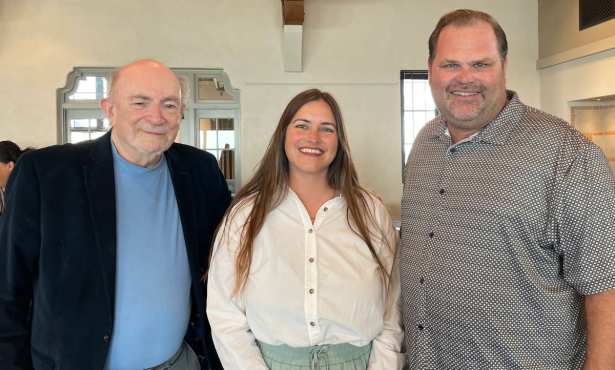Seeking the Divine
Spirituality in the Information Age
“Spiritual but not religious” has become cliché because it’s true – we are increasingly rejecting organized religion in favor of a more authentic and individualized spirituality. The fastest-growing religious movement seems to be that of no religion.
There are many reasons for this transformation, including the growth of alternative explanations about the “big questions,” often provided by modern science, as well as a rejection of the overly restrictive or outdated rules that many traditional religions impose. Reading Leviticus today, for example, with its sentences of death for adultery or homosexuality, or prohibitions against wearing clothing wool and linen together, is a surreal experience. “We’re supposed to believe this?” many of us ask ourselves. Similarly outdated, brutal, and simply strange rules exist in most of today’s religions.

What ideas should fill the gap in our psyches, if we reject, as many of us are now doing, organized religion? How do we honor our need to find meaning and purpose in our lives, if we are suspicious of the answers offered by organized religion, and also want to apply reason as much as faith in developing our spiritual views?
I am fortunate to have enjoyed a profoundly mystical experience in my early 20s. This experience seared itself into my heart and mind one night as I lay on my brother’s couch in Seattle. I had spent the evening with my brother and my father, talking with each other and with friends. We ended the evening by returning to my brother’s apartment, where we were staying, and all went to bed, me to the couch.
Upon closing my eyes to sleep I quickly found myself overcome by waves of joy and comfort, each one more powerful than the last. Lying on the couch, with eyes still closed, I felt engulfed by love. I saw a bright white light and felt myself drawn to it. Pure ecstasy is the closest description I can give. This kind of white light vision seems to have been experienced by many others throughout human history. Upon seeing and feeling the white light, I felt a deep oneness with all of nature, my fellow human beings, and a dissolution of the ego. Seeing God is as good a description of this experience as any – and many who have enjoyed experiences like mine describe it this way.
Here’s the catch: I was high on marijuana when the vision occurred to me. For many years I discounted this experience as drug-induced and thus “merely” an interesting psychological phenomenon that had happened to me. I was at that time an opinionated atheist, after having been raised an agnostic and after having spent some time in my childhood in a ’60s-style commune where “God talk” was common. I had developed a healthy skepticism toward religion and spirituality, due in part to the break-up of the commune (which occurred after revelations about the sexual and financial improprieties of its founder), combined with my growing knowledge about organized religion and its many downsides.
I was, from a fairly young age, drawn to Eastern mysticism and read voraciously through some of the Buddhist and Taoist oeuvre, at the same time that I read many Western philosophers, including Bertrand Russell, a well-known atheist who was also active in the anti-war movements of his era.
I was attracted to Buddhism because it seemed to make sense to me and it didn’t require belief in a deity. It is more of a psychology and philosophy of life than a religion. It’s mostly a way of managing emotions and negative thinking, and ultimately a way to find lasting peace. Buddhism doesn’t necessarily exclude God, in most of its many sometimes disparate schools. But it generally doesn’t highlight the role of any kind of personal God and Buddha apparently chose to stay quiet on this topic in his direct teachings.
I found many aspects of the Buddhist approach appealing, and it allowed me to develop my spiritual views further while at the same time I continued to reject the concept of God in my life or in the universe more generally.
Things change – and I continued to think, read, discuss, and experience. I have now, based on the initial impetus of my early mystical experience and my later purely intellectual investigations, arrived at a place where I can say that I believe in God. I’ve transformed from an agnostic to an atheist to a theist. My many years of thinking about the nature of mind was key to this transformation. I view mind, defined simply as subjectivity, as ubiquitous. As matter complexifies, so mind complexifies.
As I’ve written in previous columns, mine is by no means a traditional notion of God and it may not be a personal God at all (a God that relates to us directly as individuals). But it is God nonetheless. I feel quite confident in the notion of God as Source, the ground of being from which all of reality grows. God as Summit, a conscious entity, regardless of whether it has any role in our lives, is not as clear to me. I haven’t personally felt a conscious God speaking to me.
The ground of being, however – Brahman, Source, or whatever name you prefer – has been established in my life as a very real entity, through experience, insight, and meditation (I should meditate more than I do…). Through contemplation and meditation, it seems, we can remind ourselves of our identity with the Source. It is through both my own experiences and the many lines of reasoning discussed in my columns that I know the ground of being is real and that it is the source from which we all spring, from which all things spring, including God as Summit.
I do my best (not always succeeding) to re-establish this mystical connection on an on-going basis, intellectually and viscerally, in my heart and bones. It is through this connection to God as Source, that I find a perpetual and infinite source of happiness, meaning, and wholeness.
But this is my own path and it is certainly not for everyone. I don’t call myself a Buddhist and there are some aspects of Buddhism that I reject, or at least view with suspicion (karma and reincarnation, for example). Many schools of Buddhism reject the notion of a ground of being or Brahman, which I find fundamental and compelling. I’m very attracted to Vedanta Hinduism (which is based on knowing Brahman and our identity with Brahman) and Taoism, but I don’t label myself as part of these traditions either. Rather, I generally reject labels, and this is my broader point: a lot of people are now choosing to reject all religious labels. We are, instead, choosing our own paths.
Yogananda, an Indian mystic in the Kriya Yoga tradition, said it well: “Everything else can wait, but your search for God cannot wait.” In this search for authentic spirituality, experience seems to precede reason for most people. Words and concepts only go so far. For others, experience without a rational basis for spiritual views is not enough. For yet others, reason alone may well be enough to accept God and the ground of being as real, even without the profound direct experience of God as Source or as Summit.
We’re all different, and this is, perhaps the most important insight we can take from the trend away from organized religion toward a more authentic spirituality. As that pretty smart guy, the Buddha, reportedly said in his last teachings: “Be a light unto yourself.” Don’t take anything on faith or on authority. Explore, challenge, read, think, discuss. Experience.
I’m working on a film, with the same title as this column, that explores many of the ideas discussed here. I’m interviewing a number of people, experts and regular people alike, about their views and experiences with respect to modern spirituality. I’m pursuing crowdfunding to finish this film, at indiegogo.com, so if you’d like to help make this vision reality, consider making a small contribution.



